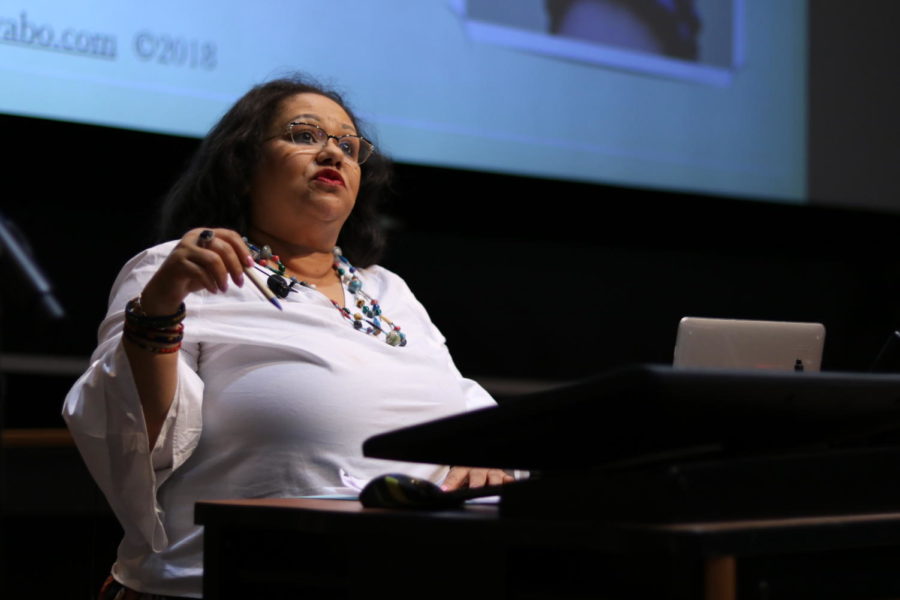Iyabo Onipede believes change starts with individuals
Iyabo Onipede gives a speech about diversity in the Howe Hall Alliant-Lee Liu Auditorium on March 7, 2018. Onipede is a graduate of the Georgetown University Law School and practiced for 20 years before becoming a life coach. She works with leaders to help identify and develop leadership skills.
March 8, 2018
Two sheets of paper were passed out to the attendees of Wednesday night’s lecture.
The first paper, a questionnaire, asked questions such as “How do you define leadership?,” “What are some of the higher ideals you will like to see in your leadership practice?” and “How is your freedom bound up with the next person?”
Christy Oxendine, international student liaison for the College of Engineering, introduced the night’s lecturer.
“She’s going to make you think, and she’s going to love on you,” Oxendine said.
Iyabo Onipede, leadership development coach, presented “Why Leadership Equity and Diversity Matters” in the Alliant-Lee Liu Auditorium at Howe Hall.
“My name is Iyabo Onipede and I’m a hope peddler,” Onipede said.
Onipede opened her lecture by reassuring attendees that questions were welcome at any point. Her goal was to leave with new knowledge from the audience and vice versa.
“I don’t want anybody to leave this room the same way they came in,” Onipede said.
She then explained her background, including her move to the United States from Nigeria at age 16. What she found in America was a country with issues surrounding diversity. Onipede said these issues still influence her life.
She attended Georgetown University law school and started her own law practice which she continued for 20 years.
It was then that Onipede found herself in what she calls her “midlife crisis.” She wasn’t happy in her career as a lawyer, so she enrolled at the Candler School of Theology at Emory University. There she was able to connect the dots on what she wanted from life and she became a life coach.
“I started to see how people were seeking from me, not knowledge, but wisdom,” Onipede said.
She described that today, leadership and how leaders operate is changing. Leadership is shifting from being knowledge based to being innovation and vision based.
“Leadership is the single most important factor in creating a sustainable world,” Onipede said.
She said having equity and diversity in leadership is important because it creates better leaders.
“You are not the best you can be without being in a pool of contrast that pushes you to be your very best,” Onipede said.
It’s this idea that Onipede incorporates into her work. Rather than tell her clients how to be better leaders, she tries to make it a conversation.
“My freedom is bound up in yours, and this is a very heavy statement,” Onipede said.
Rather than give her clients solutions to all of their problems, she requires them to give her solutions they had never thought about before. One solution has to be illegal to stretch their creativity. This is all about generating change within her clients.
“What I’ve learned is that identity is fluid,” Onipede said. “What that means is change is possible.”
She said change starts with realizing our privileges. When the audience was asked how many stairs were in the auditorium, not a single hand was raised.
“Every single person in this room [and] I don’t care the color of your skin, is privileged,” Onipede said. “We often interpret the term privilege with entitlement.”
Every audience member was privileged, in this case, because no one was in a wheelchair. Onipede said if there were someone in a wheelchair, they would know exactly how many stairs were in the auditorium.
“Be vulnerable. It’s okay,” Onipede said. “It’s scary to grow and change.”
She said the next part of change comes with actively changing our behaviors and our souls.
“You have to discipline yourself to suspend judgment when you’re engaging with people who are not like you,” Onipede said.
She utilizes her coaching skills at this point, because disciplining oneself to change can be difficult. She said certain groups of people are more resistant to change than others.
“Women and people of color are more eager to embrace change than white men, in general,” Onipede said.
To Onipede, it’s the people who can do this that continue to become good leaders. A concept Onipede believes in is systematic change. She said systematic change begins with individuals who become leaders.
“They have to leave things better than they found it. That’s what excellent leaders do,” Onipede said.
When the floor was open for questions, audience members mentioned instances where they received racist comments that were hurtful to them. Onipede commended their bravery for speaking up in front of everyone.
“You are so much more than your race, your manhood, your gender,” Onipede said.
As she mentioned before, Onipede found America to be riddled with problems of diversity and equity. She reiterated that she is a “hope peddler” and that changed individuals are the solution.
“I really believe in the goodness of human beings even when we’re at our worst,” Onipede said.
















